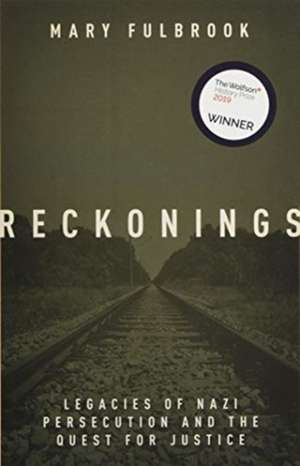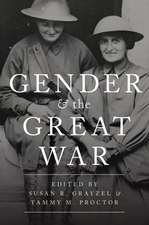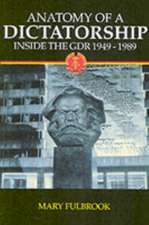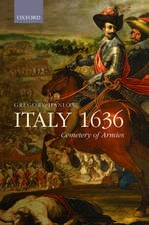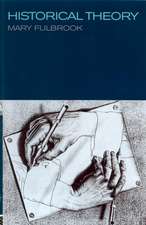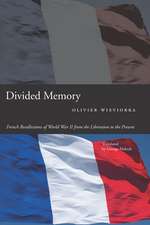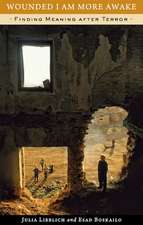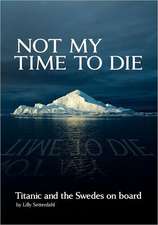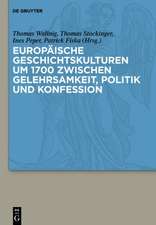Reckonings: Legacies of Nazi Persecution and the Quest for Justice
Autor Mary Fulbrooken Limba Engleză Paperback – 3 sep 2020
| Toate formatele și edițiile | Preț | Express |
|---|---|---|
| Paperback (2) | 100.88 lei 11-16 zile | +50.00 lei 7-13 zile |
| OUP OXFORD – 3 sep 2020 | 100.88 lei 11-16 zile | +50.00 lei 7-13 zile |
| HURST & CO – sep 2020 | 196.76 lei 3-5 săpt. | |
| Hardback (2) | 258.43 lei 6-8 săpt. | |
| – | 258.43 lei 6-8 săpt. | |
| Oxford University Press – 10 oct 2018 | 304.15 lei 6-8 săpt. |
Preț: 100.88 lei
Preț vechi: 113.91 lei
-11% Nou
Puncte Express: 151
Preț estimativ în valută:
19.31€ • 20.08$ • 16.18£
19.31€ • 20.08$ • 16.18£
Carte disponibilă
Livrare economică 10-15 februarie
Livrare express 06-12 februarie pentru 59.99 lei
Preluare comenzi: 021 569.72.76
Specificații
ISBN-13: 9780198811244
ISBN-10: 0198811241
Pagini: 672
Ilustrații: 30 b/w images
Dimensiuni: 162 x 234 x 50 mm
Greutate: 0.9 kg
Editura: OUP OXFORD
Colecția OUP Oxford
Locul publicării:Oxford, United Kingdom
ISBN-10: 0198811241
Pagini: 672
Ilustrații: 30 b/w images
Dimensiuni: 162 x 234 x 50 mm
Greutate: 0.9 kg
Editura: OUP OXFORD
Colecția OUP Oxford
Locul publicării:Oxford, United Kingdom
Recenzii
Reckonings is an apt title for this profound enquiry into the enormity of the Holocaust and the forms of justice with which it has been met ... What stands out in her scholarship and writing is the mutuality between her detailed tracking of structures and social processes, her knowledge of the vast literature on the Holocaust and her deep engagement, through extensive archival work, in the lives that produced, abetted, and suffered it - and still do.
This volume deserves prizes ... It is a sense of deep injustice, as well as horror, that will overcome readers of Reckonings: its main theme is how the overwhelming majority of those involved in the murder of an estimated six million men, women and children were either never brought to justice or were dealt with so leniently that it amounted to an insult to the victims.
The great strength of this book comes not from its revelations, but from the impact of the massive amount of information that [Fulbrook] has marshalled and the compelling way in which she has woven it together ... Mary Fulbrook has given that imbalance and failure to do justice the recognition it so well deserves. She had done so in an impressive and, if one can say so about such a depressing and distressing story, elegant fashion.
This masterly book challenges the ways, seven decades after the end of the war, that Europeans remember and commemorate a crime that still lies beyond understanding.
"[A] beautifully nuanced study ... It is not only full of fascinating facts and testimonies but it also gives one much food for thought, particularly on the subject of how populations can be swayed or manipulated even when they think they are sticking to their principles. A lesson for our and all times."
Extraordinarily well-researched, filled with heartbreaking, heroic and harrowing life stories, Reckonings is comprehensive, cogent and compelling. Fulbrook's book is a must-read for anyone interested in the realities - and the legacies - of the Nazi Past.
Well-written and impeccably researched, Mary Fulbrook's account of Nazi crime and punishment is a work of substance.
This volume deserves prizes ... It is a sense of deep injustice, as well as horror, that will overcome readers of Reckonings: its main theme is how the overwhelming majority of those involved in the murder of an estimated six million men, women and children were either never brought to justice or were dealt with so leniently that it amounted to an insult to the victims.
The great strength of this book comes not from its revelations, but from the impact of the massive amount of information that [Fulbrook] has marshalled and the compelling way in which she has woven it together ... Mary Fulbrook has given that imbalance and failure to do justice the recognition it so well deserves. She had done so in an impressive and, if one can say so about such a depressing and distressing story, elegant fashion.
This masterly book challenges the ways, seven decades after the end of the war, that Europeans remember and commemorate a crime that still lies beyond understanding.
"[A] beautifully nuanced study ... It is not only full of fascinating facts and testimonies but it also gives one much food for thought, particularly on the subject of how populations can be swayed or manipulated even when they think they are sticking to their principles. A lesson for our and all times."
Extraordinarily well-researched, filled with heartbreaking, heroic and harrowing life stories, Reckonings is comprehensive, cogent and compelling. Fulbrook's book is a must-read for anyone interested in the realities - and the legacies - of the Nazi Past.
Well-written and impeccably researched, Mary Fulbrook's account of Nazi crime and punishment is a work of substance.
Notă biografică
Mary Fulbrook is Professor of German History at University College London and the author of the Fraenkel Prize-winning A Small Town near Auschwitz: Ordinary Nazis and the Holocaust.
Cuprins
1 Introduction: The significance of the Nazi past; Part I. Chasms: Perpetrators and victims as communities of experience; 2 The explosion of state-sponsored violence; 3 Microcosms of violence: Toil and terror; 4 Endpoints: The machinery of extermination; 5 Defining experiences; 6 Silence and communication; 7 Crossing thresholds; Part II. Confrontations: Perpetrators and victims in German courtrooms; 8 Stages of justice; 9 Redefining perpetrators: From Euthanasia to the Holocaust; 10 Major concentration camp trials; 11 The diffraction of guilt; 12 Late, too late; Part III. Connections: Constructing links between present and past; 13 Hearing the voices of victims; 14 Making sense of the past, living for the present; 15 Discomfort zones; 16 The sins of the fathers; 17 The long shadows of persecution; 18 Oblivion and memorialisation; Conclusions; 19 A resonant past
